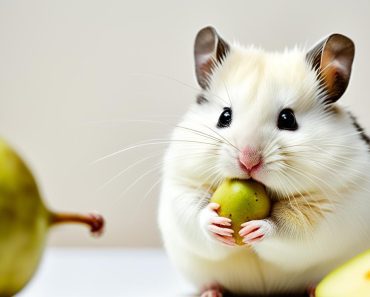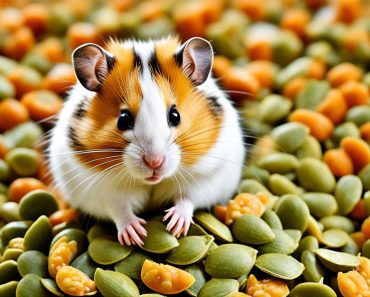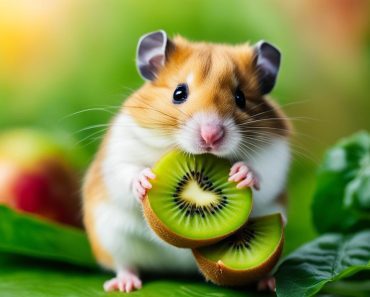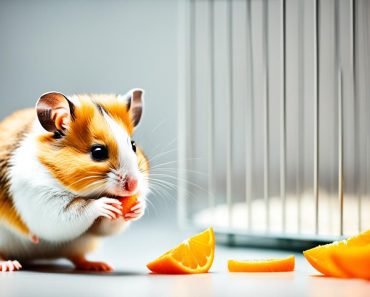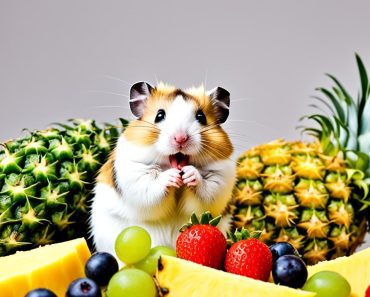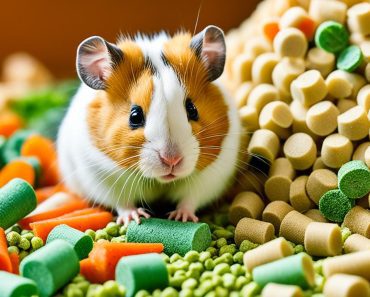As a hamster owner, you may be curious about what foods are safe for your furry friend to enjoy. One popular treat that often comes to mind is peanut butter. After all, it’s a delicious snack for humans, so can hamsters eat peanut butter too?
While peanut butter is not considered toxic to hamsters, it is not recommended as a go-to food for them. Why? Well, peanut butter is high in fat and sugars, which can contribute to weight gain and obesity in hamsters. Additionally, the stickiness of peanut butter can cause dental problems and infection if it gets stuck in their cheek pouches.
It’s also important to note that there is limited research on the safety of xylitol, a sugar replacement found in some peanut butter products, for hamsters. Therefore, it’s best to err on the side of caution and avoid giving your hamster peanut butter that contains xylitol.
However, this doesn’t mean that peanut butter has no place in a hamster’s diet. It can still be used as an occasional treat or as a way to hide medication. Just remember to use it in small amounts to prevent excessive sugar and fat intake, and be cautious about it getting stuck in their cheek pouches.
Can Hamsters Eat Peanut Butter? Yes, they can, but with careful consideration.
- Peanut butter is not recommended as a regular food for hamsters due to its high fat and sugar content.
- The stickiness of peanut butter can cause dental problems and infection if it gets stuck in their cheek pouches.
- There is limited research on the safety of xylitol, a sugar replacement found in some peanut butter products, for hamsters.
- Peanut butter can be used as an occasional treat or to hide medication in small amounts.
- It’s important to prioritize a healthy diet for hamsters, including a variety of vegetables and fruits.
The Trouble With Peanut Butter and Hamsters
Peanut butter poses several risks when it comes to feeding hamsters. While it may be tempting to share this tasty treat with your furry friend, it’s important to understand the potential consequences it can have on their health.
Risks of Feeding Hamsters Peanut Butter
Feeding hamsters peanut butter can lead to weight gain and obesity. Peanut butter is high in protein, fat, and sugars, which can contribute to an unhealthy weight for your hamster. This is especially concerning since obesity can lead to various health issues and decrease your hamster’s overall quality of life.
In addition to weight gain, peanut butter can also cause dental problems in hamsters. The stickiness of peanut butter can get trapped in their cheek pouches, leading to potential infections and dental issues. This can be painful and may require veterinary intervention to treat.
Xylitol and Hamsters
Another important factor to consider is the presence of xylitol. Some peanut butter brands contain this sugar substitute, which is highly toxic to dogs and potentially other animals. While there is limited research on the safety of xylitol for hamsters, it’s best to err on the side of caution and avoid giving them any products that contain xylitol.
Overall, it’s crucial to prioritize the health and well-being of your hamster. While peanut butter may be a beloved treat for humans, it’s best to withhold it from your furry friend in order to mitigate the risks associated with weight gain, dental problems, and potential xylitol toxicity.
Feeding Peanut Butter to Hamsters in Moderation
While peanut butter should not be a staple in a hamster’s diet, it can be given in moderation as a special treat or to administer medication. When used correctly, peanut butter can add variety to your hamster’s snack options and make medication time a little easier.
When offering peanut butter to your furry friend, it’s crucial to remember that it should only be given in small amounts. Hamsters are small animals with delicate digestive systems, and consuming large quantities of peanut butter can lead to health issues. Stick to small portions to prevent excessive sugar and fat intake that may result in weight gain or digestive problems.
If you’re using peanut butter to hide medication for your hamster, it’s an inventive way to ensure they consume the necessary dosage without any fuss. Peanut butter’s sticky texture works well to hold crushed medications, making it easier to administer while also making it more enjoyable for your hamster. Just be sure to use the recommended dosage and consult with your veterinarian if you have any concerns.
It’s important to note that while peanut butter can be a tasty treat for hamsters, it should not be used as a substitute for their regular diet. A hamster’s primary diet consists of commercial pellets and hay, which provide essential nutrients for their well-being. Peanut butter should be given sparingly and as an occasional addition to their balanced nutrition.
Remember to monitor your hamster’s reaction to peanut butter, especially if it’s their first time trying it. Some hamsters may have allergies or sensitivities, so it’s crucial to observe any adverse reactions such as diarrhea, vomiting, or difficulty breathing. If any of these symptoms occur, discontinue feeding peanut butter and consult a veterinarian.
The Importance of Portion Control
To ensure your hamster’s overall health and well-being, moderation is key when it comes to feeding peanut butter. Offering peanut butter as a treat, in small amounts, can provide mental stimulation and enjoyment for your hamster, while also allowing you to bond with them during snack time.
It’s recommended to offer peanut butter no more than once or twice a week, and only a small amount at a time. A pea-sized portion is generally sufficient, as it avoids overwhelming their digestive system and reduces the risk of obesity or dental problems. By practicing portion control, you can safely incorporate peanut butter into your hamster’s diet and enhance their snacking experience.
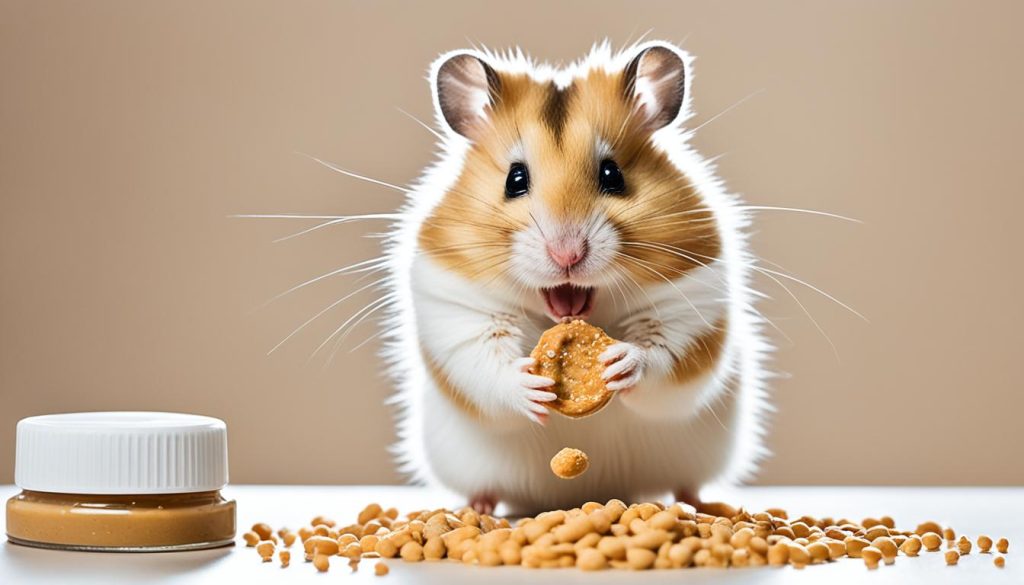
Better Treats for Hamsters Than Peanut Butter
When it comes to treating your hamster, there are plenty of delicious and nutritious alternatives to peanut butter. These treats provide a safe and healthy way to indulge your furry friend without compromising their well-being. Here are some options:
- Leafy greens: Hamsters love munching on fresh greens like spinach, kale, and lettuce. Just make sure to wash them thoroughly and remove any tough stems.
- Bell peppers: These colorful veggies are packed with vitamins and make for a crunchy and tasty treat.
- Peas: Whether fresh or frozen, peas are a great source of protein for hamsters and can be offered as an occasional snack.
- Cucumbers: Sliced cucumbers are not only hydrating but also gentle on your hamster’s digestive system.
- Carrots: Crunchy and low in calories, carrots are an excellent option for hamsters. Just remember to cut them into small, bite-sized pieces.
- Raisins: Hamsters have a sweet tooth too! A small portion of raisins can satisfy their craving for something sugary.
- Apples: These fruits provide a good source of fiber for hamsters. Remove the seeds and cut the apple into small, easily manageable chunks.
- Bananas: Rich in potassium, bananas are a nutritious treat for hamsters. Offer them in moderation due to their higher sugar content.
- Grapes: Another fruity delight, grapes can be fed to hamsters as a refreshing and wholesome treat.
Remember, these treats should be given alongside your hamster’s regular diet of commercial pellets and hay to ensure they receive a balanced and nutritious meal. Always introduce new foods gradually and monitor your hamster’s response to ensure they tolerate the treats well.
With these alternative treats, you can provide your hamster with a variety of flavors and textures while keeping them safe and healthy. Experiment with different options to find out which ones your furry friend enjoys the most!
Can Hamsters Eat Whole Peanuts?
Hamsters can enjoy the occasional whole peanut as a tasty treat. Their sharp teeth are capable of grinding the peanuts into a digestible “butter” before being consumed in their digestive system. However, it is important to note that whole peanuts should not be a regular part of their diet.
Feeding whole peanuts to hamsters as a treat can provide them with a variety of flavors and textures, which can add enrichment to their diet. The act of cracking open the shell and obtaining the edible “butter” inside can also provide mental stimulation for your furry friend.
However, it’s crucial to ensure that the peanuts are fresh, unsalted, and free from any coatings or flavorings. These added ingredients can be harmful to hamsters. Additionally, excessive consumption of whole peanuts can lead to weight gain and potential digestive issues.
As always, moderation is key when it comes to treating your hamster. Limit their intake of whole peanuts to small amounts on an occasional basis. This will help prevent any negative effects on their health and well-being.
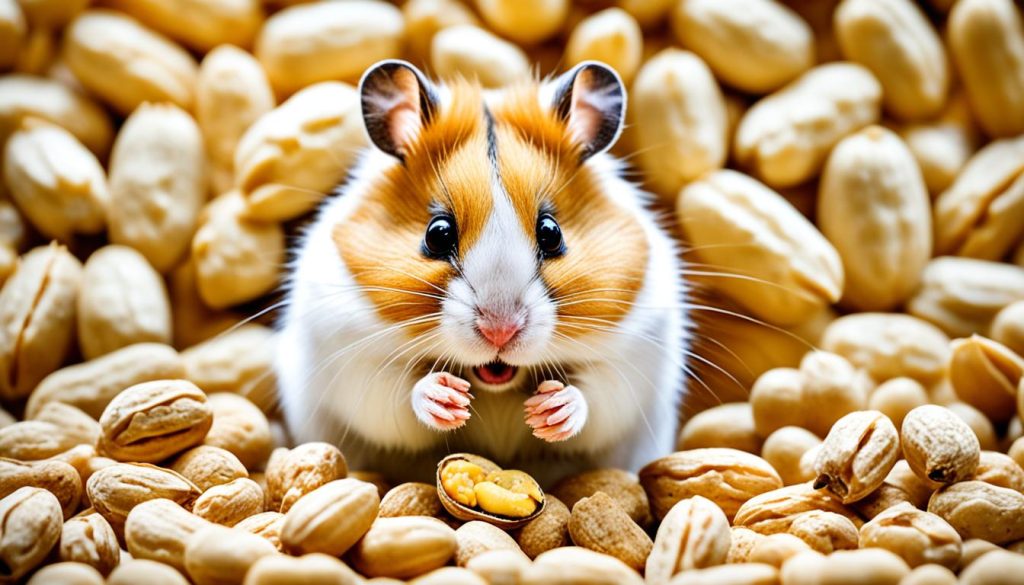
Choosing the Right Peanut Butter for Hamsters
When it comes to feeding peanut butter to your hamster, it’s essential to choose the right kind. Safe peanut butter brands for hamsters are those that contain only pure, organic peanuts without any added sugar or salt. This ensures that your furry friend receives a nutritious and healthy treat.
Peanut butter that is labeled as “plain” or “natural” is a good option as it typically doesn’t contain any added ingredients. Always check the product label to make sure it meets these criteria.
Organic peanut butter for hamsters is also a great choice as it is made from peanuts that have been grown without the use of harmful pesticides or chemicals. This ensures that your hamster’s treat is free from any potentially harmful substances.
It is important to avoid peanut butter brands that add sugar or salt, as these ingredients can be harmful to hamsters. Excessive sugar intake can lead to weight gain and other health issues, while consuming too much salt can disrupt your hamster’s fluid balance.
Additionally, be cautious of peanut butter that does not “separate” naturally. This may indicate the presence of additives or emulsifiers that can be harmful to your hamster’s health. Stick to brands that have a natural separation of oil and solids.
By choosing safe and organic peanut butter for your hamster, you can provide them with a delicious treat that is free from harmful additives and promotes their overall well-being.
Conclusion
After exploring the topic of feeding hamsters peanut butter, it can be concluded that while peanut butter is safe for hamsters in moderation, it is not necessary or recommended as a regular part of their diet. Hamsters are small animals with specific dietary needs, and the high fat and sugar content of peanut butter can contribute to weight gain and obesity.
Instead, peanut butter can be used as an occasional treat for hamsters or as a way to hide medication. It is important to use only a small amount to prevent excessive sugar and fat intake. By prioritizing a healthy diet that includes a variety of vegetables and fruits, hamsters can receive the necessary nutrients without the potential risks associated with peanut butter.
While peanut butter may be tempting to offer to our furry friends, it is crucial to remember that their well-being should always come first. So, when it comes to hamsters and peanut butter, it’s best to stick to a balanced and appropriate diet that is specifically designed for their needs.

